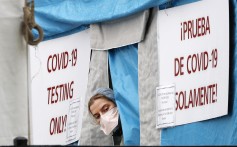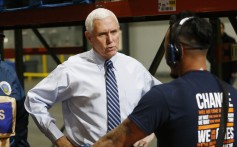BOURGEOIS POLITICAL ECONOMIST
Larry Summers, former US Treasury secretary, applauds the federal government’s swift reaction but warns there are limitations to what policies can achieve
Jodi Xu Klein in New York Published: 2 Apr, 2020

Larry Summers, former US Treasury secretary. Photo: Bloomberg
A top American economist said on Wednesday that the federal government’s economic package is a “good start” but complete recovery relies solely on containing the spread of the coronavirus.
“Success in controlling growth [of] the disease and, ultimately, putting it behind us is going to be the single most important determinant of the economic consequences of the Covid episode,” said Larry Summers, former US Treasury secretary, at a virtual event hosted by the Economic Club of New York.
Summers applauded the efforts by the Federal Reserve, Congress and the executive branch to pass legislation to stabilise the economy.
“They have made a strong start by acting with what by the context of previous crises is remarkable rapidity,” said the former director of the White House National Economic Council of the Obama administration, adding that the passage of the US$2.2 trillion package “dwarfs the Recovery Act in the spring of 2009” after the financial crisis.
Homeless in Las Vegas placed in outdoor parking lot for social-distancing
While applauding the federal government’s swift reaction, Summers warned that there are limitations to what policies can achieve.
“What happens here is ultimately going to be determined by the disease,” said Summers. “No matter how negative the interest rate, no matter how voluminous the fiscal policy, if people cannot leave their houses to work at a job or go to a store, there is going to be a very substantial limit on what the GDP can be.”
Summers warned that “the single greatest mistake that we could make would be a premature declaration of victory”.
Many New York coronavirus patients are young, surprising doctors
2 Apr 2020

He said the economy will take an even bigger hit if “we all resumed lives of relative normality and then had to return to a situation like the present”.
The massive US$2.2 trillion economic package would add to the United States’ total debt – the amount owned by the US government – that has already ballooned to a record US$23.5 trillion this year.
Summers was not concerned about the debt on Wednesday.
“If we were not to borrow, if the depression were to become that much more serious and continue that much longer, our solvency as a country would not be improved,” he said. “At this moment, the risks of under investing in our future far exceed the risks of over borrowing.”
ne challenge Summers pointed out is how to implement the massive economic plan that covers individuals and businesses with loans and grants.
“The overwhelming priority should be the protection of employees and not the protection of shareholders or bondholders who had been compensated for the risks that they have taken,” Summers said.
Pence tries to blame China and US health agency for slow virus response
2 Apr 2020

When we put Covid-19 behind us, Summers said he would expect to see a recovery that is going to take place “faster than the conventional wisdom”.
But in the short term, the outlook remains grim as about one-third of the labour force is not working, he said.
As of Wednesday, Covid-19 has infected more than 200,000 Americans and claimed more than 4,000 lives in the country. More than 75 per cent of Americans have been ordered to stay at home, keeping social distancing to contain the spread.
This article appeared in the South China Morning Post print edition as: economic recovery ‘hinges on containment of virus’

Jodi Xu Klein is an award-winning business journalist with 20 years of experience. She joined the Post in 2017, after a decade based in the US reporting for The Wall Street Journal and Bloomberg. She was part of the Time Magazine team that won the Henry R. Luce Award, breaking the China SARS story.
No comments:
Post a Comment